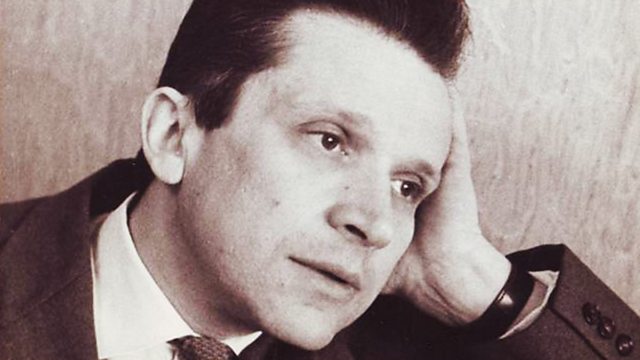
Out of the Frying Pan, Into the Fire
With Donald Macleod and Martin Anderson. Weinberg is in Moscow and, having escaped the Nazis twice, faces further threat from Joseph Stalin.
Over the past seven decades, Composer of the Week has delved into just about every major composer in classical music, and plenty of less well-known ones too. As the programme reached its 70th birthday last year, Donald Macleod challenged listeners to come up with the name of a deserving composer who had never previously been featured. Suggestions flooded in, over four-and-a-half-thousand of them, and of these, more than 20 made the case for an obscure Soviet composer of Polish-Jewish origin, Mieczyslaw Weinberg. Weinberg's music is well represented on CD, and as Donald heard more and more of it, his astonishment that he hadn't come across it before grew commensurately. So all this week, Donald Macleod explores the life and work of Mieczyslaw Weinberg, in the company of writer, broadcaster and champion of unjustly neglected composers, Martin Anderson.
Today, Weinberg settles in to his new life in Moscow. He had escaped the Nazis - twice - but now he had another threat to contend with: Joseph Stalin, whose grip on the Arts was becoming tighter with every new decree. Stalin regarded writers - and, increasingly, other artists - as 'engineers of the human soul', and he was determined to engineer their output. In 1946, the composer Khachaturian complained that Weinberg "turns to the national melos so extremely rarely" - a hint that his music was insufficiently tuneful and patriotic. Perhaps it was with this criticism in mind that Weinberg wrote his Rhapsody on Moldavian Themes, a work the authorities heartily approved of; strangely, its essentially Jewish character seems to have escaped their attention. Jews were officially tolerated by the regime but increasingly singled out for opprobrium - and worse; Weinberg's father-in-law Solomon Mikhoels, artistic director of the Moscow State Jewish Theatre, had been under surveillance for years when he eventually met his end in what was officially billed as a 'car crash'. Weinberg must have sensed that his Cello Concerto, written in the year of Mikhoels's demise, would not find official favour; he withheld it till after the death of Stalin, when it was premièred by Mstislav Rostropovich.
Last on
Music Played
-
![]()
Mieczysław Weinberg
Trio Op.48 for violin, viola and cello
Orchestra: Kremerata Baltica. Performer: Gidon Kremer. Performer: Daniil Grishin. Performer: Giedrė Dirvanauskaitė.- ECM 2368/69.
- ECM.
- 2.
-
![]()
Mieczyslaw Weinberg
Jewish Songs after Shmuel Halkin Op.17 'Tsum shlakhtman'
Singer: Richard Margison. Performer: Dianne Werner.- RCA: 82876877692.
- RCA.
- 9.
-
![]()
Mieczyslaw Weinberg
Concerto in C minor Op.43 for cello and orchestra
Performer: Mstislav Rostropovich. Performer: The UK Symphony Orchestra. Conductor: Gennady Nikolayevich Rozhdestvensky.- RUSSIAN DISC: RD CD 11 111.
- RUSSIAN DISC.
- 1.
-
![]()
Mieczyslaw Weinberg
Sonata Op.28 for clarinet and piano
Performer: Joaquín Valdepeñas. Performer: Dianne Werner.- RCA: 82876877692.
- RCA.
- 2.
-
![]()
Mieczysław Weinberg
Rhapsody on Moldavian Themes Op.47`1
Performer: St. Petersburg Radio & TV Symphony Orchestra. Performer: Vladimir Lande.- NAXOS: 8.572779.
- NAXOS.
- 1.
Broadcasts
- Tue 3 Jun 2014 12:00����ý Radio 3
- Tue 3 Jun 2014 18:30����ý Radio 3
Beethoven Unleashed – the box set
What was really wrong with Beethoven?
Composers A to Z
Who knew? Five eye-opening stories from Composer of the Week
Five reasons why we love Parry's Jerusalem
What is the strange power of Jerusalem which makes strong men weep?
A man out of time – why Parry's music and ideas were at odds with his image...
The composer of Jerusalem was very far from the conservative figure his image suggests.
Composer Help Page
Find resources and contacts for composers from within the classical music industry.





